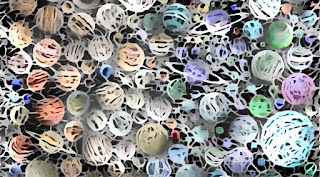Cassini explains perspective
Everything you know;
everyone you know, have known, will ever know;
everywhere you've been;
everywhere you've never been;
everywhere you could be,
including even, if NASA would only play along,
the Moon;
every song that sticks in your head
all through some rainy afternoon;
every balloon, released accidentally
by any toddler;
every toddler;
every teen;
every thought you ever think;
every meme, you cut and paste on Facebook;
every face;
every book;
every member of the appropriate sex,
who has that certain style—all in
In the sixteen hundreds, Cassini explained --
for those travelling a long way --
how to measure longitude with two clocks,
the Sun, and careful observations
of eclipsing Jovian moons.
Cassini also observed
the gap in Saturn's rings
through which we today fling
a careful dart and have it, looking back,
photograph
that one pixel : this island Earth.
So I say: stuff your rather pointless election campaign,
pour your new recipe hair conditioner down the drain,
smoke or do not smoke, if you keep it away from me
because none of that matters—
let me tell you about perspective.







